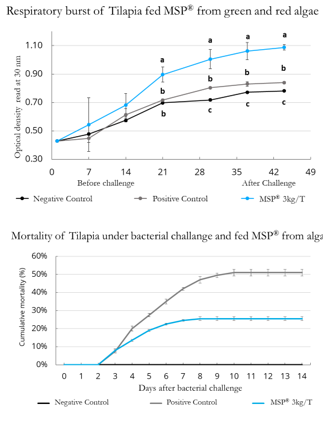MACROALGAL SULPHATED POLYSACCHARIDES MODULATE IMMUNE RESPONSE AND IMPROVE PATHOGEN RESISTANCE IN TILAPIA
The cell wall of green and red marine algae is mainly composed of water-soluble sulfated polysaccharides with several biological activities, such as immunomodulation and strengthening of the intestinal barrier components respectively. Recent research has highlighted the potential of in-feed marine macroalgal polysaccharides to improve fish immune response, barrier integrity and resistance to pathogen focusing on gill, skin and gut-associated lymphoid tissues (GIALT, SALT and GALT). The study aimed to evaluate the effects of macroalgal sulfated polysaccharides on the immune response of tilapia under bacterial challenge. The study was carried out at the Can Tho University in Vietnam at a recirculating system for 44 days. Juveniles of hybrid tilapia ( Oreochromis mossambicus × Oreochromis aureus), initial weight 57.3±2.8 g , were assigned to 3 treatments with 4 replicates (100 fish/ 100L tank), totalizing 1200 fish. Three iso-nutritive diets: P ositive Control, Negative Control and MSP® (commercial product based on the combination of green and red algal sulfated polysaccharides) , were formulated to differ only on the inclusion of 0.3% of green and red macroalgal polysaccharides at the MSP® group. Fish were fed four times a day at rate of 5% of the body weight.
At day 31, fish from the Positive Control group and MSP® (n= 200/treatment) were intraperitoneally infected with Streptococcus agalactiae (0.5 x 105 CFU/fish) and mortality was recorded for 14 days. The Negative Control group was not challenged and used as reference. Blood samples were collected at days 1, 7, 14, 21, 30, 37 and 44 for respiratory burst analysis. Neutrophils oxidative radical production (ROS) were determined in fresh blood (n=12 fish/treatment incubated with nitrotetrazolium blue chloride (NBT) and absorbance read at 680 nm. Results were subjected to ANOVA and Tukey's test, p<0.05). Neutrophils ROS were significantly higher in fish fed MSP® compared to the Positive Control group at days 21 and 30 before challenge (up to 25%) and days 37 and 44 after challenge (up to 29%) . The mortality rate at day 14 was 49 % lower in fed diets containing MSP® compared to Positive Control group (26 % vs 51%). These results highlight the efficacy of MSP® to improve tilapia's resistance to pathogens.
